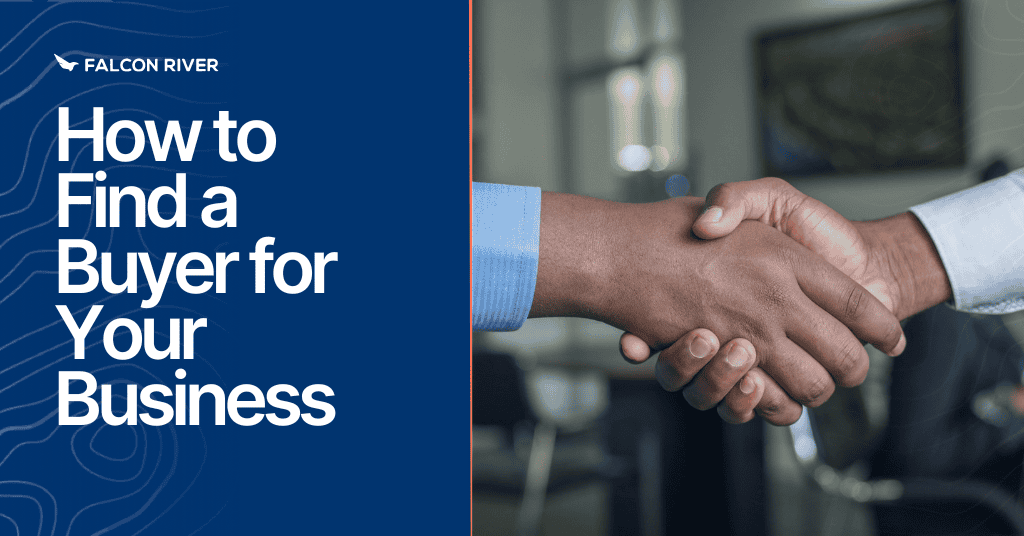
When it comes to finding a buyer for your business it’s not an easy task. Selling a business isn’t like selling a house or a car.
Selling any business is a complex transaction. We are here to help. In this article, we cover the steps you need to take to find a buyer for your business.
TL;DR:
- When you want to find a buyer for your business you’ve got to take several steps to prepare for a smooth and successful exit.
- You need sale-ready accounts, a realistic valuation, post-exit growth potential to interest a buyer, and ideally qualify for a seller-financed SBA guaranteed loan.
- Once you’re ready, there are several ways you can look for a buyer: your network, suppliers, customers, online M&A platforms, and work with a dedicated referral partner.
We cover the steps you need to take to be sale-ready in this article.
We also cover five ways you can search for a buyer yourself, or work with people who can help you find the right buyer for your business.
Let’s dive in . . .
Why Do You Want to Sell Your Business?
Before you put your business up for sale ⏤ whether off-market or publicly ⏤ you need to decide if it’s the right move.
We say that not to put you off the idea, but to make sure it’s something you’ve clearly thought about. Once you’ve sold it, you no longer own something you’ve probably spent years building and sacrificing for to make a success.
Even if as part of the deal you work for your new owners for a while; what’s known as a vested earn-out period (there are pros and cons to this approach), they’ll be calling the shots.
In many ways, this decision is often an act of necessity or because you want to do something different.
Every year, out of the 33 million small businesses in the US, “roughly 500,000 businesses change hands each year”, based on BizBuySell.com and U.S. governmental data.
Business owners sell for many reasons:
- It’s time to retire and there’s no succession plan in-place;
- The business is in distress and it’s time to get out (even a distressed asset is still an asset to someone);
- You want to invest in property, or travel;
- You want to invest in a new business venture or several as an angel investor;
- Or it comes down to a significant life change, such as a loved one who’s seriously ill, or having a baby. If you don’t have the time and energy to dedicate to your business it could be the perfect time to move on.
Now, let’s take a closer look at the five steps you need to take so your business is sale-ready, and then five ways to find a buyer.
Is Your Business Sale-Ready? 5-Point Checklist
Because selling a business is a complex, multi-faceted transaction, it pays to be ready before you put it on the market.
It’s also smart to be patient. Although with the right deal-sourcing partner, you could sell in under 30 days, there’s a certain amount of preparation required so that a sale can go through quickly.
This way, if you’ve got everything a potential buyer needs before due diligence starts you can be confident it should go through much smoother. Otherwise, you risk potential buyers looking for other acquisition targets if you’re taking too long to get all of your ducks in a row.
Here are the five steps we recommend you take before putting your business up for sale.
1. Do you Have Sale-Ready Accounts?
Buyers need to assess a range of financials during due diligence, so it makes sense to have these ready before a potential buyer takes an interest:
- Cashflow and projections to show Discounted cash flow (DCF)
- Cash-on-hand and current receivables
- P&L and the balance sheet
- Revenues (MRR, ARR)
- A summary of current assets, liabilities, EBITDA, and DCF.
- You might also be asked to present business bank statements during due diligence, so they can see proof of cashflow and dividend payments.
Once you’ve got these ready, or as many of these documents prepared as possible by your accountant, it’s time to get everything else prepared. You’ll also need these to secure any kind of SBA-backed loan to attract a potential buyer.
2. Do You Have a Realistic Valuation?
You’ve worked hard to start, grow, and keep your business running.
Naturally, you want to get a good price for all of that hard work. It’s better to go into an exit situation with a valuation that you can support with evidence.
Unless you work with a broker, there are two ways to calculate a valuation:
- Have a professional valuation analyst work out a realistic valuation;
- Use valuation calculators that could provide a ballpark figure.
The sale valuation of your business depends on a number of factors:
- Revenue and revenue streams
- Cashflow, which is factored as discounted cashflow. In other words, what’s the business likely to generate on its current growth trajectory in the next 3 years?
- P&L (Profit & Loss) and EBITDA
- What’s the growth potential with the right amount of investment?
- What does the business own that makes it more valuable: intellectual property, an engaged audience/database, or a high-value website?
- How does the business compare to competitors, and have there been any sales that are comparable that would factor into the valuation estimate?
A ballpark estimate would be a valuation within the region of 2 – 3X annual recurring revenue (ARR). Although, numerous factors could influence the actual figure, you could get less or a lot more.
It also depends on the terms of the deal, such as whether the new owner wants you to work in the business as an operator/manager in return for a vested earn-out period.
In that case, you’d probably get a lump sum of cash upfront, and then further payments once growth targets are hit before you can walk away.
3. Have Your Legal Documents Ready
Alongside financial accounts, you need to have a lawyer prepare several documents (or you can download and modify templates):
- A Non-disclosure agreement (NDA).
- A Confidential Information Memorandum (CIM): This means you can share financial documents with a potential buyer.
- A Letter of Intent (LOI): This should safeguard you against a buyer trying to make a low-ball offer after you’ve already gone through due diligence.
- A Definitive Agreement, and a Non-Compete Agreement, once it looks like the deal is going ahead.
4. Are you Pre-Qualified for a Seller-Financed SBA-Guaranteed Loan?
It would make the sale of your business go much smoother if you’re pre-qualified for a seller-financed SBA-guaranteed loan.
With a seller-financed loan guaranteed by the SBA, it means:
- A buyer doesn’t have to put as much cash upfront to complete the purchase;
- It’s quicker getting a seller-financed loan than a potential buyer;
- Buyers have more confidence in the long-term growth potential of the business after it’s sold;
- Makes a business easier to sell for the owner and easier for a potential buyer to buy it.
5. Do you Have an Idea of What Kind of Company Would Make an Ideal Strategic Buyer?
Finding an ideal strategic buyer is comparable to looking for an ideal customer profile (ICP).
Except in this case, you only need one customer, and they need deep pockets.
Buyers of small businesses, especially online businesses come in many shapes and sizes. You’ve got numerous options:
- Business aggregators: Companies that buy, manage, and grow a portfolio of online businesses;
- Serial entrepreneurs or syndicates of them that do the same;
- Larger competitors;
- Suppliers and vendors;
- Businesses that don’t compete with yours but offer services that would sit well together, like a PPC agency buying an SEO agency.
You might already know or have a potential buyer in mind. Or you might be looking for someone or a business you don’t know who fits the criteria you’re aiming for.
Now, let’s look at five ways to find a buyer for your business.
4 Ways to Find a Buyer Without Using a Broker
Assuming you don’t want to hand over 10 to 20% of your business valuation to a broker, there are other ways to sell a business, whether that means promoting it online or going off-market.
1. Talk to Clients, Suppliers, Partners
As we mentioned above, a potential buyer could be a:
- Larger competitor;
- Supplier or vendor;
- Businesses that don’t compete with yours but offer services that would sit well together, like a PPC agency buying an SEO agency
In any of these cases, the acquisition would be strategic for the buying party. Your business could be an asset that would help them grow, reduce costs, and grow, or expand into a new market.
A buyer could generate numerous synergies, cost-savings, and growth opportunities after the deal is completed. If you take this approach to look for a buyer then it’s worth framing the offer in those terms.
2. Leverage Your Network
It’s always a smart move to make use of your network.
Most business owners accumulate 1000s of connections over the years. Without realizing it, you could be one message away from finding a buyer for your business.
It’s worth compiling a list, beyond partners, suppliers, and customers, of people you know who could be worth contacting. Even if they’re not looking to buy, they may know someone who would be interested.
3. Use Online M&A Platforms
There are dozens of online M&A platforms.
They’re useful places to advertise your business for sale if you aren’t interested in going off-market. That’s where you source a proprietary deal flow of potential buyers or work with a partner who can match you with an ideal strategic buyer.
We covered 10 online M&A platforms in this article, including:
- Acquire.com: One of the most active and largest platforms for owners looking to sell. Its network includes over 500K buyers and sellers.
- Flippa: Another very popular platform, with over 450,000 businesses sold through Flippa so far.
- Empire Flippers: A hybrid of an online marketplace and brokerage, with $500 million worth of deals done on the platform to date.
- Latona’s: An online brokerage that comes with a listings and search tool.
- BuySellEmpire: Been around since 2018, making the business of buying and selling businesses easier. It comes with tools for buyers and sellers.
All of them are worth looking at as a way to market and sell your business. Make sure to check what kind of fees each platform takes if a sale does go ahead.
In most cases, online M&A platforms are cheaper than brokers ⏤ who usually take 10 to 20% of the final sale price ⏤ but there are other ways platforms can extract fees.
4. Use Social Media & Newsletters
Another way to sell a business is to simply announce it across your social media platforms.
For software indie developers, Twitter (X) is very popular for this, especially amongst those who are part of the #BuildInPublic movement. In this online community, most founders showcase revenue and other metrics on a monthly basis.
You could also use newsletters, podcasts, and platforms like LinkedIn to announce that your business is for sale.
Bonus Tip: Let Falcon River Help
We know how hard it can be to sell a business.
It’s why we established Falcon River so that we can help business owners find buyers and buyers find business owners who are ready to sell. Reach out if you want to sell your business, we’re here to help!
Key Takeaways: How To Find a Buyer For My Business
There are numerous ways to find a buyer once you’ve got ready to sell and have an idea of who your ideal buyer is.
💡Bonus Tip: Don’t be surprised if you get an email out the blue from a company or serial entrepreneur who’s actively looking to buy.
If you’re part of the #BuildInPublic movement on Twitter/X then this will help you win customers and bring you to the attention of acquisition partners.
That happened to Mark Whitman, the founder of Contentellect, who sold his content marketing agency to Onfolio for $850,000 in cash.
His exit came about through an unexpected email because Onfolio was scouting for acquisition targets.
💡Bonus Tip 2: Also, don’t be surprised if you make your sale public ⏤ M&A platforms and social networks ⏤ to get a lot of interest, but no serious offers. That happens a lot, as Idan Masas, founder of EasyShorts said on X:
“I’ve talked with almost 300 different “interested buyers” … [who] “had money right now”, and yet many of them are simply looking for information.
Serious buyers have cash ready and complete a sale quickly.

Any of the methods covered in this article could work for you. It only takes one buyer to say yes for the right price.
Work with Falcon River to sell your business: quick, organized, fair, and no broker fees.

